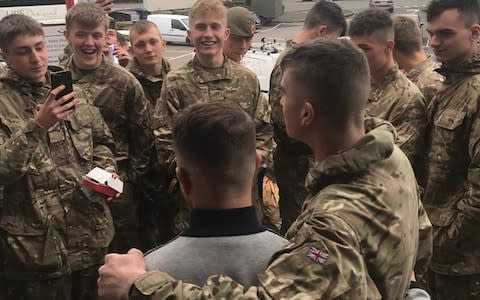Army trainee soldiers face investigation by MoD after posing for picture with EDL founder Tommy Robinson

British Army soldiers under initial training are facing an investigation by their superiors for posing for a picture with the founder of the English Defence League (EDL) Tommy Robinson and chanting his name.
The 35-year-old former leader of the far-Right group posted images to his Facebook page which included a video of young men in camouflage uniform.
He uploaded the video with the caption: “A moment like this makes it all worth while. Today I met real British heroes,” he wrote as a caption.
An forces spokesman said The Army was aware of the photograph and footage and is "investigating the circumstances surrounding this".
Robinson, an anti-immigration and anti-Muslim activist whose real name is Stephen Yaxley-Lennon, is currently on bail awaiting a re-trial for a contempt of court charge.
He later posted a video of himself ranting on his social media page saying it was "unbelievable" that The Army was investigating the soldiers who he met at motorway services off the M1.
Reacting to the pictures and videos being circulated on Wednesday, Major General Rupert Jones, who will shortly take up the appointment of Standing Joint Force Commander, said he was "confident" extremist views are not prevalent in the forces.
He said: "The British Army is absolutely clear that we do not tolerate extremist views and we don't tolerate extremist behaviour.
"I am very confident that is a widely held position across the Army. Much of the reaction to that incident from our people tells you that."
There has been wide condemnation of the images, including from the Muslim Council of Britain, which accused Robinson of "remaining silent on the sacrifices Muslims and others made in the two world wars".
Maj Gen Jones added: "The Army absolutely encourages diversity in our teams. We are stronger for diversity - we have very high expectations and standards and we will comply with those."

He also tried to play down ongoing concerns about Army recruitment and staffing levels.
Between April 2016 and March 2017, 8,194 soldiers joined the British Army, but 9,775 left.
Regardless of numbers, Major General Jones was confident the Army can fulfil its duties.
He said: "The key thing is: have we got the manpower to meet all of our operational commitments? And the answer to that is an undoubted 'yes'."
Maj Gen Jones denied reports of soldiers previously dismissed for drug offences being offered large payments to return to the forces.
He said: "The Secretary of State has been really clear on this - the British Army is not going to bring back people into the military who have been caught for drug offences.
"The bonuses for coming back into the military are very carefully targeted to draw back in people with very specialist skills. It's really targeting that."
Maj Gen Jones will join 120 troops at a reception at the Palace of Westminster on Wednesday afternoon.
Troops have been invited to Parliament by James Gray, the Conservative MP for North Wiltshire, for a welcome home reception to honour the Army's deployments in 55 nations around the world during the last 12 months.
Maj Gen Jones said: "It's really important for British people to see what the military are doing on their behalf.
"We live in an era of constant competition - the threats are diversifying and we cannot underestimate those threats, and I think it's important that the British public understand that."

 Yahoo News
Yahoo News 